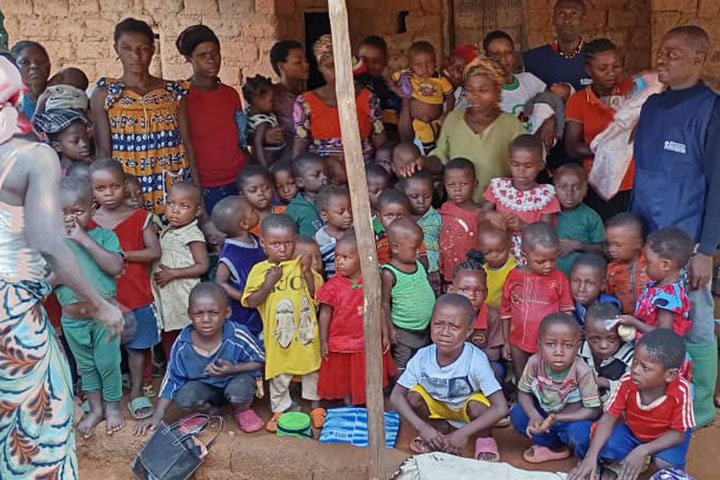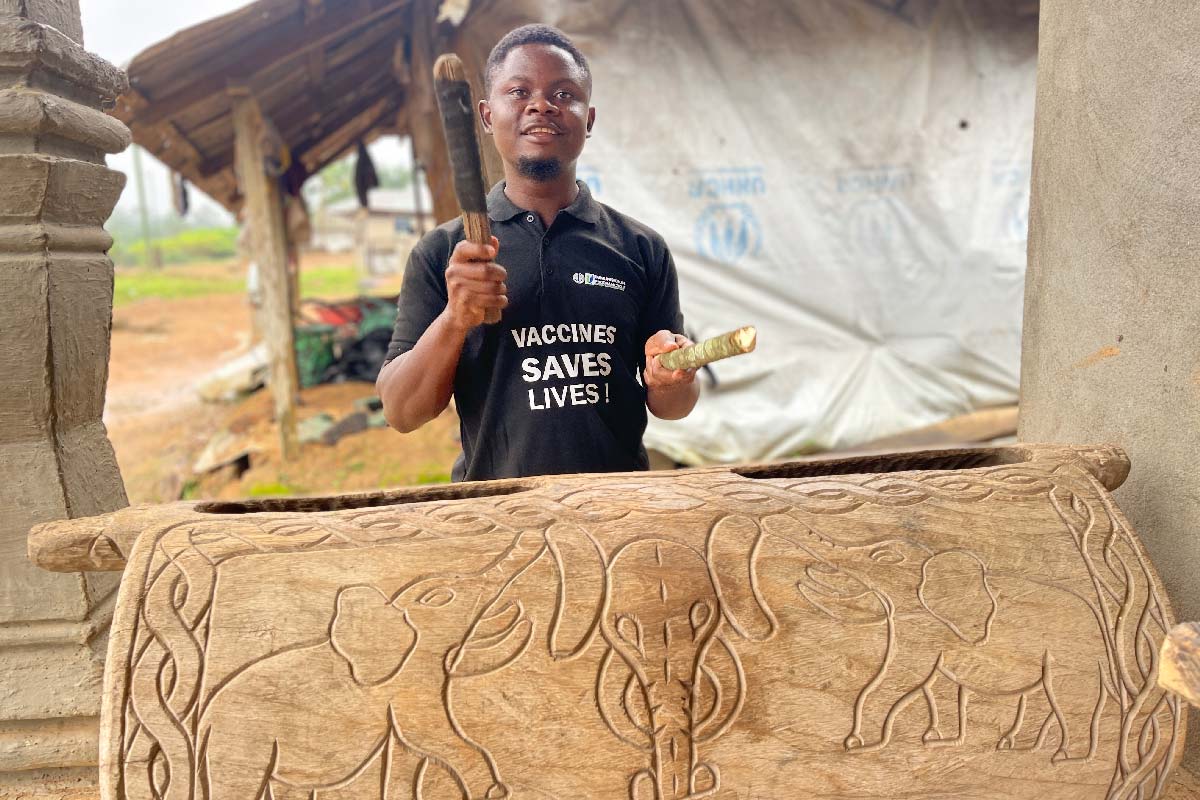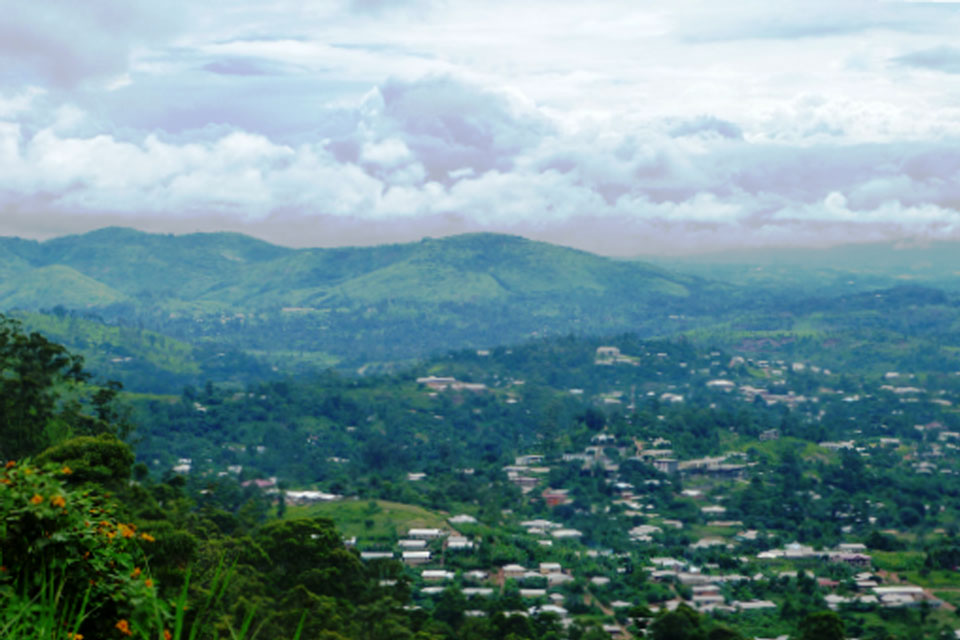Faith-based organisation bridges immunisation gap in conflict-affected regions of Cameroon
In Cameroon’s embattled Northwest and Southwest regions, where health centres lie in ruins, one religious health institution has stepped into the breach, delivering vaccines and hope.
- 20 May 2025
- 4 min read
- by Delphine Fri Chifor

For nearly a decade, conflict has dogged Cameroon’s two Anglophone regions. Once vibrant and productive places now echo with gunfire. Once bustling health posts lie all but abandoned.
Over 70% of the health districts in the Northwest and Southwest regions been affected; facilities vandalised and burned, health workers attacked, and supply chains disrupted. As a result, over 40% of the population in these regions can no longer access basic healthcare services.
The repercussions of the crisis have also directly affected the immunisation uptake. Nationally, while one in six children under five is considered zero-dose (not having received any routine vaccine), in the Northwest and Southwest, that number is at nearly one in four. That widened immunity gap raises the risk of deadly outbreaks of diseases such as measles, polio and diphtheria, compounding existing humanitarian hardship.
Beyond the infrastructure collapse, the Anglophone crisis has planted a seed of mistrust for government services. In some communities, vaccination is viewed through a political lens. “How can the people who killed my husband think well about my son?” a grieving mother in Bamenda asked, as she rejected vaccines for her child.
CBCHS: a legacy of trust and a bridge to hope
Founded in 1936 with the establishment of Mbem Hospital in Donga-Mantung, the Cameroon Baptist Convention Health Services (CBCHS) has grown into one of the most respected healthcare institutions in the country.
With over 80 health facilities nationwide, more than 40% are concentrated in the crisis-hit Northwest and Southwest, where its headquarters are also located. The CBCHS model is rooted in Christian values and community trust, shaped by over 80 years of walking alongside the people it serves – more than 5 million Cameroonians every year.
“Our strength lies in our proximity to the people,” explains Prof Tih Pius Muffih, Principal Investigator of the CBCHS Immunisation Program. “We have not parachuted into the crisis; we’ve lived through it with them. That’s why we know how to listen, engage, break barriers and reach the underserved.”
Have you read?
Such a legacy, coupled with the fact that its field teams are composed of culturally-accepted community health workers who can respond to local fears, enables the CBCHS to enter spaces where other actors are rejected.
“We use people who speak the language, understand the trauma and carry the community’s respect,” says Mufu Kelvin, CBCHS Field supervisor in Konye. “When mothers see someone they know from church or market, they listen differently.”
Leveraging local leadership to meet total human need beyond vaccines
In these devout communities, spiritual leaders are more than guides. They are gatekeepers of public opinion. Recognising this, CBCHS works closely with pastors, imams, traditional leaders and women leaders to demystify vaccines and rebuild trust.
“We preach about the salvation of the soul and also of the body. Vaccination is part of that gospel,” declares Kumba South’s Rev. Mbua Augustine, who integrates immunisation messaging into sermons. These trusted voices have amplified public health messages and turned their pulpits and palaces into platforms for health advocacy.
Once CBCHS has negotiated access and built trust, it does not only deliver vaccines. Through integrated outreach, it partners with organisations to provide humanitarian kits that include nutrition packs, hygiene supplies, prenatal care and basic medical consultations.
“These families have lost everything. When we come with vaccines and food, we’re not just treating a child, we’re restoring dignity,” emphasises Ful Morine, CBCHS Humanitarian Lead.
Where non-state armed groups control access, CBCHS carefully negotiates safe passage through community intermediaries. Using guidance from the Navashi Grid and humanitarian principles, they train their staff in conflict sensitivity and risk mitigation to facilitate access.
“Access doesn’t just happen. It takes time, trust and negotiation,” explains Dr Foyeth Eugene, CBCHS Immunisation Program Manager. “But when we succeed, the impact is profound.”
One such breakthrough was in Bopo Bakundo, a village deep in the forest controlled by non-state armed groups, and unreachable for years. “They vaccinated my three children with pentavalent for the first time,” shared Chanceline with tears of joy. “My firstborn, now seven, missed out, but at least the three others, five, three and one years old, are now protected”
Measurable impact in an unstable landscape
Despite immense challenges, CBCHS has achieved what many deemed impossible. Within 2022 and 2024, over 36,675 doses of pentavalent and meningococcal conjugate vaccines were administered to children in the Northwest and Southwest through CBCHS-led initiatives, with some conflict-affected districts reporting a 20% increase in coverage within the period.
“CBCHS never left us. They were among the few who came when no one else dared,” affirmed His Royal Highness Fon Atemkeng of Fontem. “Our children are alive today because of them.”
CBCHS stands as a testament to what is possible when health delivery is rooted in trust, culture and faith. Their success proves that even in war zones, public health can thrive when powered by credibility, empathy and strategic partnerships. The fight, however, is far from over. Thousands of children remain unreached, and insecurity continues to challenge access. However, the CBCHS blueprint to leave no child behind is on the move.









